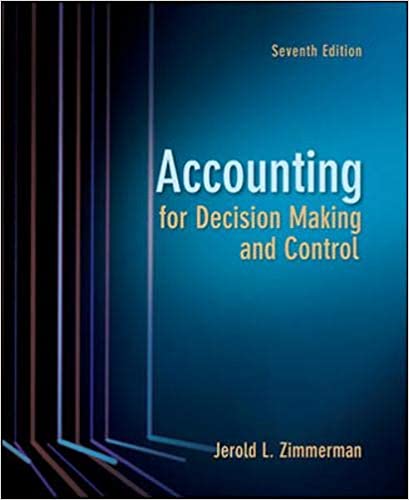
Accounting for Decision Making and Control 7th Edition by Jerold Zimmerman
Edition 7ISBN: 978-0078136726
Accounting for Decision Making and Control 7th Edition by Jerold Zimmerman
Edition 7ISBN: 978-0078136726 Exercise 24
Mutual Fund Company
Mutual Fund Company (MFC) is considering centralizing its overnight mail function. Five departments within MFC use overnight mail service: trades processing, trades verifications, securities processing, accounts control, and customer service. Although these departments send different types of packages (weight and content), they often send packages to the same destinations. Currently, each of these departments independently contracts for overnight mail service. The five departments' present rates are: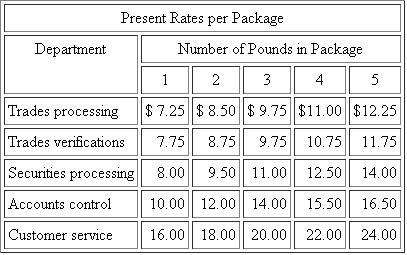 ?MFC has requested that each of the five departments submit an estimate of its overnight mail for the coming year. The departments' estimates are as follows:
?MFC has requested that each of the five departments submit an estimate of its overnight mail for the coming year. The departments' estimates are as follows: 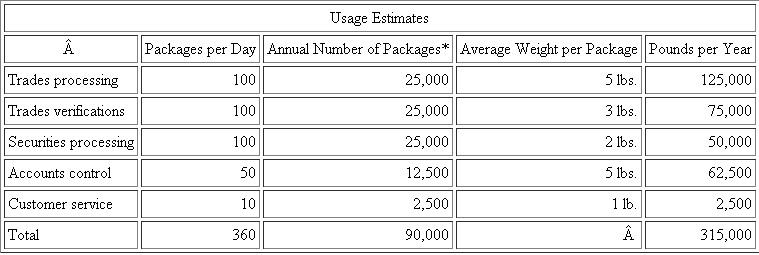 * Based on 250 days per year.
* Based on 250 days per year.
?Using these volume estimates, MFC was able to negotiate the following corporate rates with EXP Overnight Express: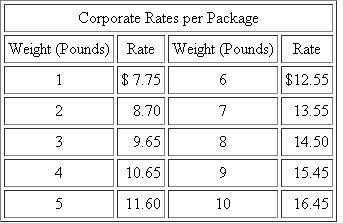 ?The centralized overnight mail unit would be run as a cost center. All expenses would be charged back to the five departments. The chargebacks would have two components:
?The centralized overnight mail unit would be run as a cost center. All expenses would be charged back to the five departments. The chargebacks would have two components:
1. The corporate rate per package charged by EXP (based on weight).
2. An overhead allocation per package.
?MFC plans to use a prospective overhead rate. Pounds per package will be used as the allocation base. As each package comes in, overhead will be charged. The rate will be set at the beginning of the year, allowing the overnight mail service to be costed as it is used. The common costs that make up overhead are labor, supervision, and other expenses as follows: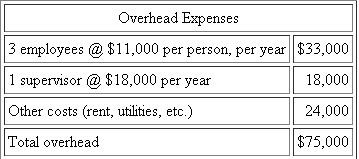 ?At this time, there is much controversy and skepticism about the centralization of the overnight mail function. The managers of trades processing and trades verifications are most opposed to the proposed system. They claim not only that it is unfair but also that the annual cost savings created by this centralized system do not justify a change
?At this time, there is much controversy and skepticism about the centralization of the overnight mail function. The managers of trades processing and trades verifications are most opposed to the proposed system. They claim not only that it is unfair but also that the annual cost savings created by this centralized system do not justify a change
Required
a. Calculate the overhead allocation rate that would be used with the centralized system.
b. Calculate the estimated overall cost and department cost of MFC's overnight mail service under both the present system and the proposed centralized system.
c. Discuss why the managers of trades processing and trades verifications are opposed to the proposed centralized system. Do you agree with their criticisms?
d. Evaluate the proposed method of allocating overhead under the centralized system. Is there a better method for allocating cost? If so, what is it?
e. Do you think the proposed centralized system can be improved? If so, how?
SOURCE: A Di Gabriele, M Perez, N Rivera, C Tolomeo, and J Twombly.
Mutual Fund Company (MFC) is considering centralizing its overnight mail function. Five departments within MFC use overnight mail service: trades processing, trades verifications, securities processing, accounts control, and customer service. Although these departments send different types of packages (weight and content), they often send packages to the same destinations. Currently, each of these departments independently contracts for overnight mail service. The five departments' present rates are:
 ?MFC has requested that each of the five departments submit an estimate of its overnight mail for the coming year. The departments' estimates are as follows:
?MFC has requested that each of the five departments submit an estimate of its overnight mail for the coming year. The departments' estimates are as follows:  * Based on 250 days per year.
* Based on 250 days per year.?Using these volume estimates, MFC was able to negotiate the following corporate rates with EXP Overnight Express:
 ?The centralized overnight mail unit would be run as a cost center. All expenses would be charged back to the five departments. The chargebacks would have two components:
?The centralized overnight mail unit would be run as a cost center. All expenses would be charged back to the five departments. The chargebacks would have two components:1. The corporate rate per package charged by EXP (based on weight).
2. An overhead allocation per package.
?MFC plans to use a prospective overhead rate. Pounds per package will be used as the allocation base. As each package comes in, overhead will be charged. The rate will be set at the beginning of the year, allowing the overnight mail service to be costed as it is used. The common costs that make up overhead are labor, supervision, and other expenses as follows:
 ?At this time, there is much controversy and skepticism about the centralization of the overnight mail function. The managers of trades processing and trades verifications are most opposed to the proposed system. They claim not only that it is unfair but also that the annual cost savings created by this centralized system do not justify a change
?At this time, there is much controversy and skepticism about the centralization of the overnight mail function. The managers of trades processing and trades verifications are most opposed to the proposed system. They claim not only that it is unfair but also that the annual cost savings created by this centralized system do not justify a changeRequired
a. Calculate the overhead allocation rate that would be used with the centralized system.
b. Calculate the estimated overall cost and department cost of MFC's overnight mail service under both the present system and the proposed centralized system.
c. Discuss why the managers of trades processing and trades verifications are opposed to the proposed centralized system. Do you agree with their criticisms?
d. Evaluate the proposed method of allocating overhead under the centralized system. Is there a better method for allocating cost? If so, what is it?
e. Do you think the proposed centralized system can be improved? If so, how?
SOURCE: A Di Gabriele, M Perez, N Rivera, C Tolomeo, and J Twombly.
Explanation
Cost Allocation
Cost portion is the way...
Accounting for Decision Making and Control 7th Edition by Jerold Zimmerman
Why don’t you like this exercise?
Other Minimum 8 character and maximum 255 character
Character 255


